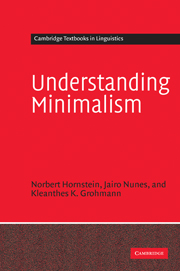Book contents
- Frontmatter
- Contents
- Preface
- List of abbreviations
- 1 The minimalist project
- 2 Some architectural issues in a minimalist setting
- 3 Theta domains
- 4 Case domains
- 5 Movement and minimality effects
- 6 Phrase structure
- 7 Linearization
- 8 Binding Theory
- 9 Feature interpretability and feature checking
- 10 Derivational economy
- Glossary of minimalist definitions
- References
- Language index
- Name index
- Subject index
3 - Theta domains
Published online by Cambridge University Press: 05 June 2012
- Frontmatter
- Contents
- Preface
- List of abbreviations
- 1 The minimalist project
- 2 Some architectural issues in a minimalist setting
- 3 Theta domains
- 4 Case domains
- 5 Movement and minimality effects
- 6 Phrase structure
- 7 Linearization
- 8 Binding Theory
- 9 Feature interpretability and feature checking
- 10 Derivational economy
- Glossary of minimalist definitions
- References
- Language index
- Name index
- Subject index
Summary
Introduction
Let's get back to basics once again. One of the “big facts” listed in section 1.3 is that sentences are composed of phrases organized in a hierarchical fashion. Given our GB starting point, this big fact is captured by X′-Theory, according to which (i) phrases are projections of heads; (ii) elements that form parts of phrases do so in virtue of being within such projections; and (iii) elements within a phrase are hierarchically ordered. More specifically, phrases are endocentric objects with complements being in the immediate projection of the head and specifiers being outside the immediate projection of the head. Given this background, chapter 1 sketched as a minimalist project the elimination of government as a primitive relation within the theory of grammar. The conceptual motivation for dropping government is that once we need phrases anyhow, we should in principle stick to the structural relations that phrases bring with them. Thus, it is methodologically costless to avail oneself of the head-complement and specifier-head (henceforth, Spec-head for short) relations – and on the same token, it becomes costly to assume that we need more than these two relations. In particular, government comes out of this discussion as a methodological encumbrance worth dumping.
In this chapter, we examine whether government can be dispensed with within the domain of Theta Theory, the grammatical module responsible for licensing thematic or θ-roles. In particular, we will discuss θ-assignment in structures involving external arguments in sections 3.2 and 3.4 and ditransitive predicates in section 3.3.
- Type
- Chapter
- Information
- Understanding Minimalism , pp. 76 - 110Publisher: Cambridge University PressPrint publication year: 2005



